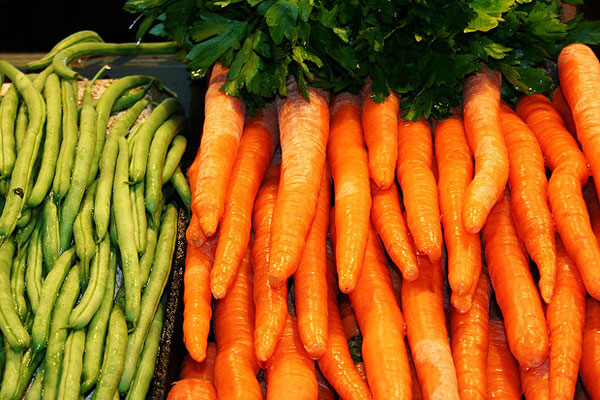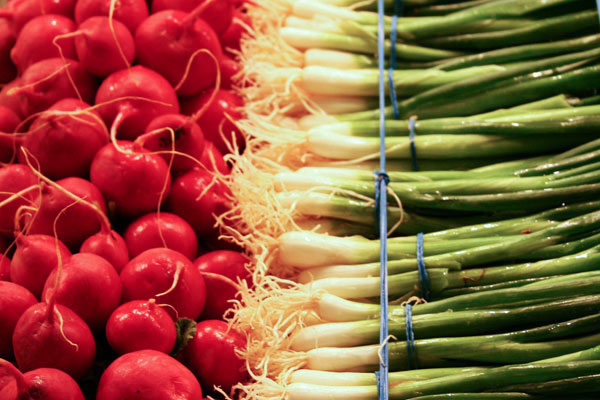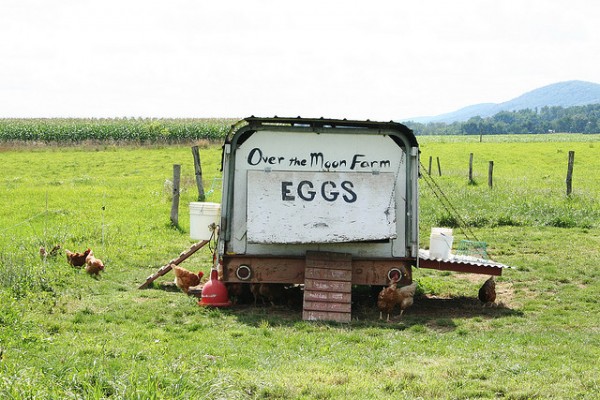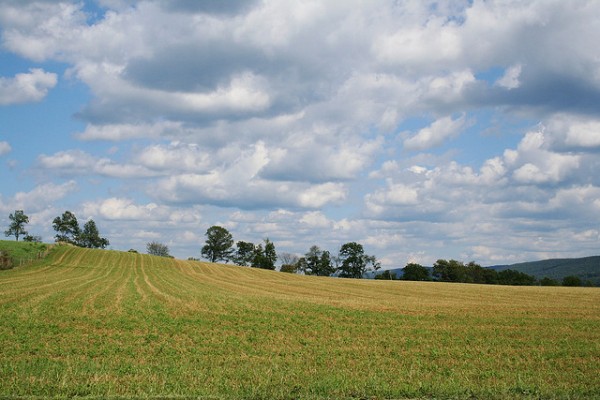Last week we attended the local premier of the documentary Forks Over Knives. I covered the event for WPSU’s Local Food Journey and produced a radio story, which aired this morning. But neither Nick nor I have really stopped thinking about the film’s claims since we viewed it.
Let me start with an overview. The film follows the friendship of Dr. Colin Campbell of Cornell University and Dr. Caldwell Esselsyth of the Cleveland Clinic. Both grew up on dairy farms and started their careers in traditional medicine, meaning they attempted to control and cure ailments with drugs and surgeries. However, through observations (detailed in The China Study), research, and practice, they identified a real connection between what we eat and how we feel, and they began to prescribe changes in diet to manage, and even reverse, chronic diseases.
Forks Over Knives includes both scientific data and real-life anecdotes to support the claim that animal proteins — like chicken, steak, milk, and eggs — promote cancer, raise cholesterol, and increase the risk of stroke.
Yes, it’s true that a lot of Americans eat an unhealthy amount of meat. Portion sizes of roast beef and filet mignon and pulled pork have increased, right along with our waistlines and our medical bills. This is not a sustainable way of life — for our bodies, our wallets, or our planet. But is veganism the answer?
I appreciate and admire the work of Drs. Campbell and Esselsyth. The two have saved many lives by promoting a plant-based diet. In the film, they — along with other non-conventional medical professionals — take patients to the grocery store, demonstrate what to do with unfamiliar foods like kale and quinoa, and check in almost daily. As a result, the patients decrease their dependence on prescription drugs and, in some cases, completely reverse their chronic health conditions.
Unfortunately, I just don’t think that veganism is a viable option for most Americans. Let me explain.
Most of us were raised to believe that meat provides protein and dairy provides calcium. These are true facts. And you can’t just eliminate either from your diet and not sufficiently replace them — which requires education and creativity, not to mention moral support. I’m not saying it’s impossible — in fact, I have the utmost respect for individuals who succeed in such a lifestyle — but I do think it’s improbable. (And this is not even taking into consideration the foods that our government chooses to subsidize, feeding into the likelihood that Americans will choose a cheap, convenient diet over a wholesome, healthy one.)
Personally, I can more strongly connect with Mark Bittman‘s flexitarian philosophy, which combines “the sensibility of being a vegan with the pleasure of being an omnivore.” Let’s not deprive ourselves of a cheeseburger or a taco, but let’s top both with extra lettuce, tomato, and avocado. Let’s not feel guilty about the ground turkey in our chili, as long as it also includes shredded carrots and zucchini, or the sausage on our pizza assuming it’s alongside mushrooms, onions, and peppers. Let’s consider meat as more of a condiment and less of the main event. And let’s consume it as conscientiously as possible — with consideration for our environment as well as ourselves.
Again, this is the philosophy that I choose to follow, but I don’t expect you all to agree. I just know that I will not succeed if I deprive myself of things I enjoy — like spaghetti with meatballs, barbecue ribs, and hot fudge sundaes. Moderation is key.
That being said, here are a few of our favorite vegetarian recipes. I promise you won’t miss the meat:
- Apple harvest quinoa
- Moroccan vegetable stew
- Orzo with roasted eggplant and cinnamon-cumin dressing
- Roasted butternut squash orzo salad
Forks Over Knives is definitely worth seeing. I guarantee it will change the way you think about food — just as Food Inc. did before it.
What’s your food philosophy?





Amen! Everything in moderation! Meat is a huge part of our diet!
Very interesting! Great comments from you guys.
I’m amazed at how little meat we eat in our house since my youngest daughter became a vegetarian six or seven years ago. It’s really become almost an afterthought, akin to your meat-as-a-condiment take. That being said, I’m still on board with good (read: non-factory) meat. I ordered some farm-raised/slaughtered/butchered pork from a co-worker this week, and am looking forward to fresh, clean, local cuts on the table when it arrives.
We’ve also moved to more organic produce since my favorite natural foods store (Nature’s Pantry in State College) gets it weekly, year-round, from a domestic supplier, and the prices are reasonable. Makes winter more bearable since the farmers’ markets won’t be back for months.
I’ve never quite understood the vegan thing, though. Not that I disagree; I’m just confused by the rationale that, say, honey represents something unhealthy. The no meat/milk concept is easier for me to get my brain around, but I’m not there yet, nor probably ever will be.
I fully agree with you regarding the flexitarian way of life. I probably still eat more meat than I should, but that I am consciously attempting to reduce my family’s intake is, I think, a positive step. You’re right – it’s hard to become a vegetarian (and even more so, a vegan) in America’s food culture. So many people think they can just “stop eating meat.” It’s just not that easy!
What an interesting post! I’m trying to ramp up our veggie intake and cut back on the bad stuff. Like you said, moderation is the key!
I guess my position if veganism is fairly obvious given that we’re dairy farmers. I do, however, admire the commitment vegans make. It’s hard work.
Surprisingly, many of the vegans I know struggle with their weight. I am not sure why. My guess is it takes note calories to feel full.
Amen to moderation!
Alison
I love the idea of “flexitarian” diets!! I dvr Oprah and yesterday’s episode featured Kathy Freston, author of “Veganist” who spoke about vegan lifestyles. I totally agree with your perspective on eating consciously and not depriving yourself. Love your blog – can’t wait to try one of your recipes!
Firstly thank you for a great blog – I liked your entry and how you were open to both sides but I think people need to be very careful when they get into the mindset of “moderation is the key”. Everyone is different and have different points of view. For one person moderation could be allowing themselves only one serve of meat per week, for another it might mean they will allow themselves one meat free meal per day – a very big difference. Unfortunately (for the meat lovers out there) it can no longer be ignored – A plant based diet rich in whole foods drastically minimises your risk of chronic diseases including cancer, heart disease, diabetes, osteoporosis – just to name a few.
Really we cant afford not to make the switch – we spent over one trillion dollars on healthcare way back in 1997. In fact the cost of our “health” is spiralling so far out of control that the Health Care Financing Administration predicted that our system would cost 16 trillion dollars by 2030…that money has to come from somewhere…inevitably taxes will go up because of this. Cardiovascular disease is the leading cause of death in this country – and its something that can directly be controlled by proper nutrition.
Be very careful when assuming moderation is the key. Its can cost you your health, a lot of money and ultimately your life.
I appreciate your insightful comment, Em. And I agree that “in moderation” means something different to everyone. It’s nice to have all points of view represented, and you’re the first to comment in strong support of a plant-based diet. We really are making an effort to eat more consciously, and I hope others are, as well!
I’ve had this bookmarked to comment upon for ages, but all I’ll say at this late date is great post, Emily – keep it up and I know you’ll have a cadre of readers and fans.
Great Post Emily!! I totally agree with the Flexitarian viewpoint and have changed my cooking to reflect this. Now I add vegtetables (usually carrots) to my ground turkey when cooking. I use romaine lettuce instead of tortilla shells to wrap my taco meat to reduce the carb intake. I load my eggs with veggies. I have also started eating smaller amounts of meat and adding more fresh organic raw veggies to my diet. I feel so much better now.
I wish more doctors would explain the health benefits of vitamins and nutrients found in food to patients over prescribing drugs. Food Matters is a great documentary about this.
My husband and I have been watching alot of documentaries lately on food and will add Forks Over Knives to the list.
i’m a vegan, but not because i am opposed to eating meat; rather, it’s how we go about it in this country that i don’t like. over 90% of all animals raised for meat are raised in factory farms, which ensures them a miserable life and death. i may go back to eating meat and dairy at some point when i can know for 100% where those products came from. until then, i refuse to support the animal abuse that is rampant in the american food system.